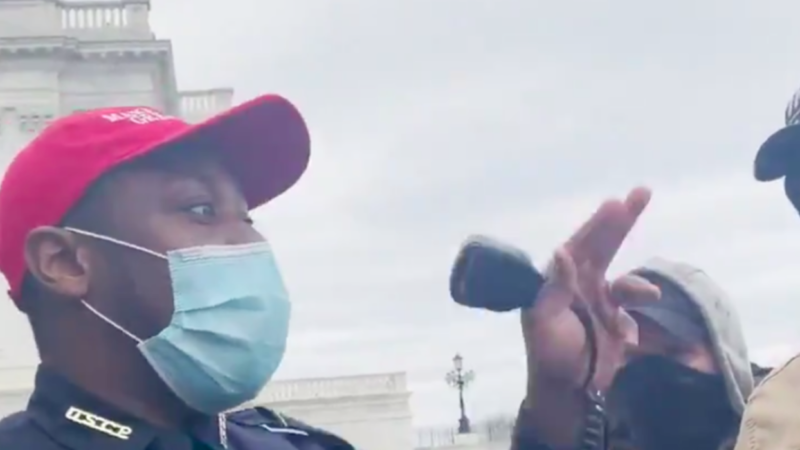The Capitol Riot, Qualified Immunity, and Politics as Usual
Objections to police reform are often more rooted in partisan knee-jerk reactions than in sensible policymaking.

This week we learned that at least two U.S. Capitol Police officers have been suspended and up to 15 are under investigation for inappropriate conduct during the January 6 insurrection that saw a violent mob storm the Capitol building in protest of Congress certifying President-elect Joe Biden's victory in the 2020 election.
Of those on leave, one officer took a selfie with rioters, while the other donned a Make America Great Again hat and appeared to give out directions. The riot resulted in five deaths, including that of Officer Brian D. Sicknick as well as a woman who was fatally shot.
https://twitter.com/AlexMillerNews/status/1349170806228733956?s=20
The USCP has weathered heavy criticism for being ill-prepared for the planned insurrection, though it's worth noting that several officers attempted to hold off the crowd. A viral video shows Officer Eugene Goodman diverting rioters away from the Senate floor. Capitol cops were trampled, struck with clubs, and attacked with chemical irritants as some protesters chanted "Hang Pence" and "Where's Nancy?" There's something deeply ironic about a group of insurrectionists colluding with a few cops and stampeding over others in order to keep a president in power who has made "backing the blue" and "law and order" two hallmarks of his tenure.
"The [United States Capitol Police (USCP)] Department has been actively reviewing video and other open source materials of some USCP officers and officials that appear to be in violation of Department regulations and policies," said Acting Chief of Police Yogananda Pittman in a statement. "Our Office of Personal Responsibility will investigate these behaviors for disciplinary action, up to, and including, termination."
Another officer is under investigation by the Secret Service after she took to social media on January 7 to characterize lawmakers who voted to certify the election results as "committing treason" in real time. "Good morning patriots!" she wrote. "Yesterday started out beautiful and as usual Antifa soured the mood and attacked police and an Air Force veteran was murdered….It's OFFENSE time finally!!" A handful of off-duty cops were caught participating in the riot itself.
In the immediate aftermath, a slew of politicians released statements condemning the insurrectionists and thanking law enforcement, many of whom are certainly deserving of that thanks. But lawmakers must also wrestle with an uncomfortable reality: It seems those two groups are not entirely mutually exclusive.
How should legislators respond? As it so often goes, objections to police reform are frequently more rooted in partisan knee-jerk reactions than in evidence or in the needs of constituents. One example where lawmakers should, in theory, have common ground: qualified immunity, the legal principle that makes it notoriously difficult to hold cops accountable when they violate your civil rights. A majority of the American public supports making changes to the doctrine, which prevents victims from suing officers unless their alleged misconduct has been outlined almost identically in a previous court precedent.
Some in Congress have attempted to make that change, including former Rep. Justin Amash (L–Mich.), who introduced the first bill to abolish qualified immunity, and Sen. Mike Braun (R–Ind.), whose bill would have rolled the doctrine back significantly. Both of those efforts landed in the legislative graveyard that has come to define America's governance.
Yet it's worth considering how qualified immunity may or may not help the rogue cops who chose party over country January 6, and how that information might impact future reform discussions.
"Let's assume we've got a really clear-cut case where one of these Capitol police officers actively collaborated with elements of the mob in such a way that facilitated their ability to enter the Capitol and engage in misconduct," says Clark Neily, vice president for criminal justice at the Cato Institute. "The first question would be, were you a person whose civil rights were violated as a result?"
That hypothetical suit would be "an interesting challenge" here, he notes, in that it requires "somebody who could plausibly allege they suffered some harm as a proximate result of this collaboration." That would usually require pinpointing a "documentable" repercussion: "That normally means a physical injury, but not always," says Neily.
Making an emotional distress claim isn't unheard of, although if past case law is any indication, such an officer would likely be shielded by qualified immunity. The U.S. Court of Appeals for the 7th Circuit Court awarded the legal protection to a prison guard after he unshackled an inmate and hid as the prisoner raped a nurse at the Delnor Community Hospital in Geneva, Illinois. Two patients brought the suit after claiming to have suffered post-traumatic stress disorder as a result of the guard's professional negligence and cowardice.
Perhaps it's unlikely that a member of Congress will come forward with new evidence of bodily harm and a corresponding lawsuit, but the events last week provide another reminder that stale partisan talking points are failing the American people in practice. Almost eight months have passed since the death of George Floyd galvanized a national conversation around accountability in law enforcement, particularly as it relates to qualified immunity—though, on the federal level, the status quo remains.
Liberals have historically been more amenable to such reform. But even as the U.S. enters a new legislative session with Democrats controlling both Congress and the presidency, an overhaul of qualified immunity is hardly a guarantee.
"Both parties are more or less equally beholden to the law enforcement lobby," says Neily. "Police, prosecutors, and prison officials have worked very, very hard to establish the current status quo—and they like it." In other words, politics as usual.


Show Comments (109)